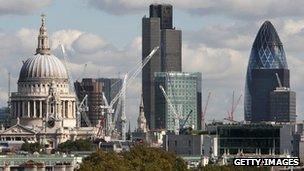Libor: The final humiliation for banks
- Published
- comments

The end of self-regulation for the City?
If ever there was a symbol that regulators and government no longer trust banks to do the right thing, it is today's formal announcement that the British Bankers' Association will no longer oversee the setting of Libor.
In the words of Martin Wheatley's review of how this important benchmark of interest rates is set, "the BBA acts as the lobby organisation for the same submitting banks that they nominally oversee, creating a conflict of interest that precludes strong and credible governance".
In other words, there is no longer any nook or cranny in the City of London where self-regulation can be trusted to work.
Which I suppose is not a great surprise, after all those revelations about how bankers at Barclays tried to rig Libor rates to generate unfair profits on deals linked to their respective bonuses - and in advance of similar revelations that will be forthcoming soon about bankers' Libor conduct at other banks, including Royal Bank of Scotland.
In place of the BBA - which, it should be remembered, actually created Libor in 1986 and has administered it throughout its history - there will be a data provider (an organisation such as Bloomberg or Reuters) or a regulated exchange.
This new administrator of Libor will be selected by a committee to be chaired by the former 3i chair Baroness Hogg and which will be set up by the Treasury and the Financial Services Authority.
All that said, some would say it is a bit odd (ahem) that the Financial Services Authority and the Bank of England did not take evasive action to grip the Libor-setting process back in 2008, when problems in the market first became conspicuous. And, as it happens, the BBA asked them for help at the time but was rebuffed.
Or to put it another way, no one - banks, BBA or regulators - emerges with any credit from this mess.
Why does any of this matter? Well the Libor rates are supposed to indicate the cost of borrowing for banks. and they are in turn used for the pricing of financial transactions worth more than $300 trillion (yes, trillion) and even have an impact on the mortgage rates we pay.
So, for confidence that the City of London is doing its job properly, it is important that Libor is set in a fair, robust and reliable way.
Wheatley has two other important reforms, apart from turfing out the BBA.
First, a load of rates that are barely used, in less heavily traded currencies (the Aussie dollar, the NZ dollar, the Canadian dollar, Swedish krona and Danish krona) and in funny maturities will be axed.
Also the interest rates bankers submit to the panels that calculate the benchmarks will be based on actual transactions, rather than the historic practice of a banker sticking his wet finger up in the air and wondering which way the financial wind is blowing.
Second, the whole Libor-setting process will be firmly brought inside the regulatory net, so that the procedures followed by banks in submitting rates for the Libor calculations will be vetted by regulators and attempting to rig the rate will become an unambiguously illegal action.
Some may say that it is weird that such an important cog in the global financial machine was allowed to free-wheel, with no oversight or maintenance by regulators, for so long. But then when we look back on the great faith everyone placed in banks and financial markets before the great crash of 2007-8, so much of what transpired seems to belong to another universe.